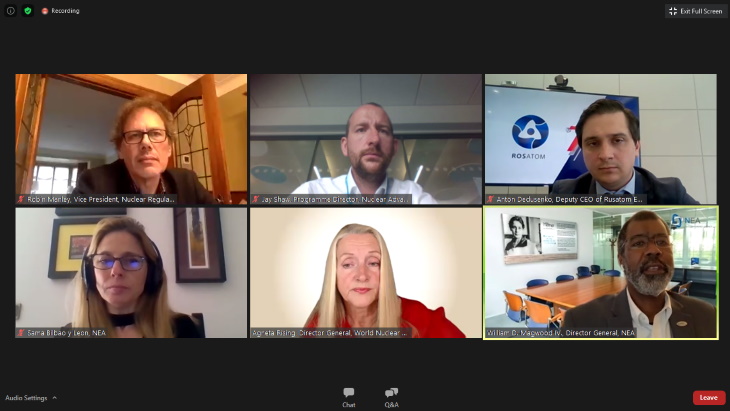"The post-COVID-19 economic recovery is a perfect opportunity to create jobs and economic development while continuing to move ahead with the energy transition," the NEA said it its Policy Brief. Investing in nuclear energy, it said, creates a large number of high-skilled jobs, accelerates the transition to a low-carbon economy, and increases energy resilience. These jobs also provide "high spill-over investment" into the local and regional economy, it added.
"As the world's societies and economies continue to endure the effects of the COVID-19 crisis, it is crucial that planning starts for the post-pandemic recovery," the Policy Brief says. "With most OECD governments aiming at an economic recovery that preserves the ambition for affordable energy transition plans, any post-pandemic economic recovery plans and associated investments must align with long-term economic, social and environmental objectives – be it the Paris Agreement or the UN Sustainable Development Goals. With rising unemployment in the wake of the pandemic, the question of how to deliver socially equitable and affordable decarbonisation, whilst preserving and developing quality employment has to be at the core of all revitalisation plans."
Introducing today's webinar, NEA Director General William Magwood said: "The opportunity before us is to develop a modern, resilient, zero-carbon infrastructure, and this might take some time. And that means investment in nuclear. While it will not give you all the returns and all the jobs in months, over the course of years it gives you a very realistic approach to having a zero-carbon economy. This takes time, this takes analysis, but I think that once countries examine the possibilities resulting from nuclear construction, they will be very interested in pursuing this option."
Magwood noted that jobs created during the construction of a nuclear power plant can last for up to six years, and when the plant is in operation there are very high-paid, high-tech jobs lasting up to 80 years.
Sama Bilbao y Leon, head of the NEA's nuclear technology development and economics department, said policy makers need to promote investment in nuclear projects that galvanise long-term sustained economic development. They should not only consider the number of jobs that would be created, but also their quality, duration and location.
"On the one hand, we want to achieve our long-term economic, social and environmental objectives, but we also want to do it in a way that we still achieve our ambition to get affordable energy transition plans; in other words, to achieve the decarbonisation that most countries in the world have set for themselves following the objectives of the Paris agreement and also the UN Sustainable Development Goals."
"As countries ratchet down the emissions target it becomes more and more costly to maintain a secure supply of energy," said Agneta Rising, Director General of World Nuclear Association. "But by including some dispatchable low-carbon electricity sources in the mix these costs can be reduced greatly. Nuclear stands out in terms of its technical maturity, scalability and the potential to use it for a range of non-power applications."
The nuclear industry is calling on governments around the world "to duly consider nuclear and its socio-economic, environmental and public health benefits in any energy transition plan, and enact policies to ensure the realisation of the many benefits of nuclear energy," she added.
Anton Dedusenko, deputy CEO of Rusatom Energy International JSC (REIN JSC), provided employment figures from its construction projects in Turkey and Finland. He noted that at the Akkuyu site in Turkey there are currently 6000 workers at the construction site, about 80% of whom are Turkish citizens.
"We expect that the construction personnel will exceed 16,000 people, with 11,000 qualified workers during peak construction time, and most of these will be Turkish citizens," he said. "In the operational stage we expect at least 700 Turkish highly-qualified experts to be involved and in order to prepare them we have launched, starting in 2011, a programme of training for Turkish personnel at key Russian institutions."
At the Hanhikivi site in Finland, about 20,000 workers and specialists are expected to be employed during the construction phase, with Finnish companies performing around 80% of the preparatory works on site. A total of 4000 workers are expected to be on site at peak construction. Dedusenko noted that throughout its 60-year lifetime, a plant comprising two VVER-1200 units will boost the national economy by USD40-60 billion.
It is not only new build nuclear projects that can provide jobs and boost the economy, but also projects to extend the operation of existing reactors. Robin Manley, vice president of nuclear regulatory affairs and stakeholder relations at Ontario Power Generation noted the company's project to refurbish its Darlington plant is expected to cost CAD12.8 billion and create 14,000 jobs. In the long term, it is expected to boost the Ontario economy by CAD90 billion.















